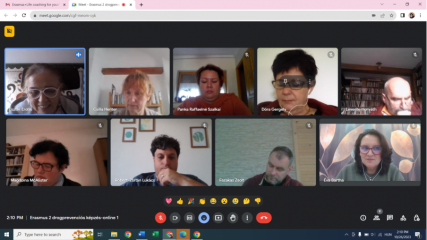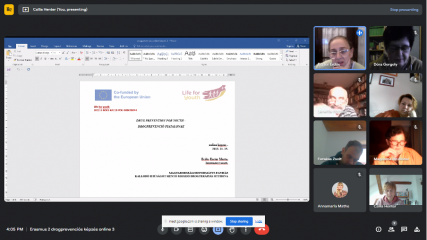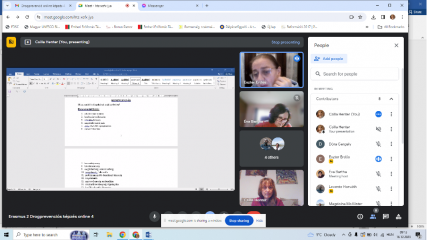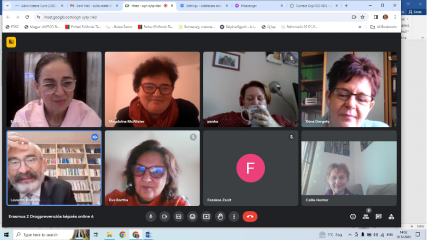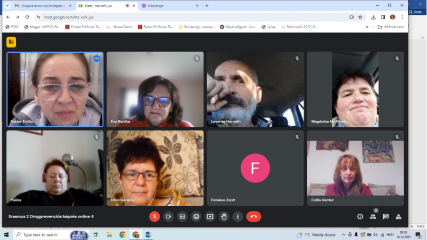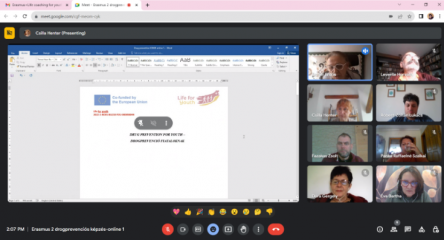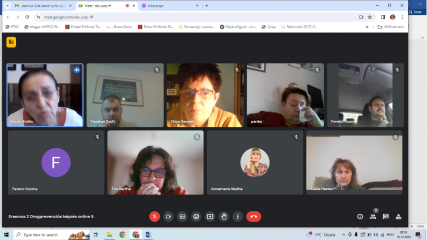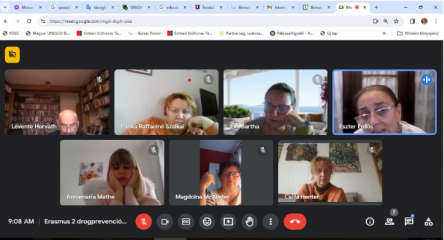Erasmus + – Life for Youth – Online Professional Training – Ráckeresztúr | Hungary

Life for Youth
2022-3-RO01-KA210-YOU-000098044
Drug Prevention for Young People
Online Professional Training
Ráckeresztúr, Hungary
26.10.2023 – 19.12.2023
Summary
The professional training held in Ráckeresztúr between October 9-14, 2023, was followed by six additional online training sessions, each lasting five hours a day. The aim of these sessions was to provide further professional assistance in the practical application of the knowledge acquired, address any questions arising during the testing phase, respond to challenges encountered while applying the methods, and share and resolve case studies collectively.
The first virtual session, held on October 26, focused on group interactions, particularly how to achieve goals during drug prevention group sessions with young people and the role of the specialist in this context. The specialist acts as a moderator, ensuring a safe environment, facilitating discussion, intervening when necessary, and constantly monitoring the interpersonal dynamics within the group, while encouraging positive attitudes. Sharing and connecting offer opportunities for young people to develop in all six competencies. Sharing past traumas, confronting current dilemmas and mistakes, recognizing progress and growth, addressing needs, fostering empathy, and motivating a supportive attitude all contribute to the development of the goals set for competency development. The sense of shared destiny empowers young people and allows them to try out the learned methods in their everyday lives. Expressions of mutual support are positively reinforced and recognized, becoming effective motivational tools. The experience of positive change contributes to the development of behavioral control and the willingness to engage in helping behavior. Speaking out strengthens relationships, and practicing assertive communication becomes part of everyday life.
The second online training session, held on November 4, focused on expressing feelings. In this session, participants simulated a group exercise where young people learn to articulate their emotions. Elements of the session included reporting on the completion of commitments made in the previous meeting, evaluating the group’s progress, and highlighting positive aspects; introductions; sharing how each participant feels (feelings circle); finding a support person within the group to help achieve the learning objective; and practicing self-reflection. The emphasis was on learning to express feelings and experiencing a responsive and supportive environment. Young people often struggle to talk about their feelings, and expressing them helps develop personal competencies. The learning objectives were reinforced in a mutually supportive environment, helping cognitive reinforcement. Positive feedback improves social skills and the confident use of communication tools. The display of love, trust, and safety within the community allows for spiritual development and the formation of responsible human behavior. For professionals, acquiring these competencies is equally important for effectively managing the group.
The third session, held on November 15, focused on learning and teaching self-awareness. Questions included: “Who am I?” “What values and skills do I have?” “What are my strengths?” “How can I develop my abilities?” “Which of my skills will help me integrate into a community?” Self-awareness actually facilitates development in all competencies. Recognizing personal values encourages young people to adopt results-oriented behavior. Becoming aware of their positive traits motivates them to develop further competencies. Understanding their motives and acquiring problem-solving skills strengthens the development of a healthy personality. Integration into society, reflecting on relationships with family, and planning these relationships can further develop communication, social, and spiritual skills. To achieve these goals, the professionals learned and practiced experiential pedagogy methods.
The fourth online training session, held on December 16, focused on the role of the specialist in prevention. The presenter highlighted the importance of specialists having the skills they wish to teach; without these skills, they cannot be credible. A client can only be brought to the level that the specialist has attained. Ambiguity should be avoided, and practicing honesty and integrity leads to sincerity. Small issues should be addressed with manageable therapeutic steps. The goal is not to solve the problem immediately but to teach the necessary skills and personal responsibility. The specialist’s task is to help create a safe, accepting, and community-oriented group environment, within which activities and tools are provided to prepare young people for integration into society.
The fifth online session, held on December 18, involved familiarizing participants with different types of groups. Some problems cannot be resolved with the help of just a peer support person. In such cases, it is recommended to discuss the case in a group session, where the group analyzes the problem and formulates solutions through open debate. The specialist is only a facilitator, ensuring communication flows smoothly, while maintaining a safe environment and adherence to the rules. Depending on the nature of the issue, several types of groups exist: conflict resolution groups (for handling personal conflicts), problem-solving groups (e.g., addressing negative behavior), sexual abuse groups (for individuals with sexual issues), etc. Addressing such issues helps develop problem-solving, conflict management, empathy, assertive communication, and accountability among both group members and specialists.
The final training session, held on December 19, focused on supervision, self-help, and internal training opportunities for professionals. To fulfill their role optimally and serve as role models, professionals need to maintain their mental health, engage in self-reflection, and preserve their psychological well-being. Supervision groups can be very helpful in this process. This session provided an opportunity for supervision, where participants, through specific exercises, reconsidered their relationship with the act of helping, including its motivations and goals. In the closing circle, participants agreed to continue organizing such supervision and mutual support meetings even after the project concludes.

